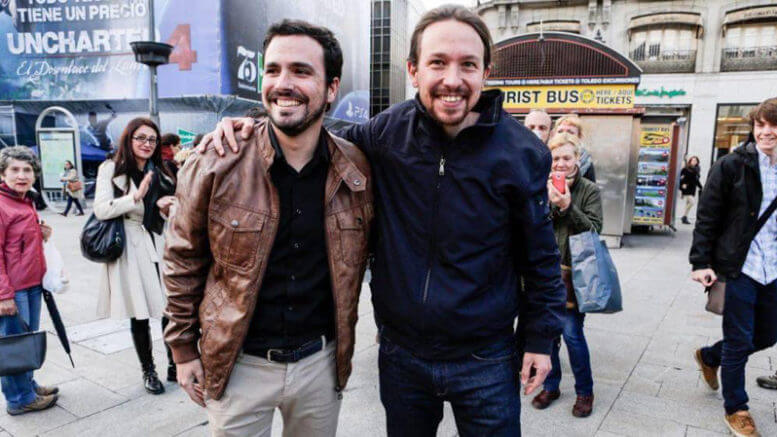By Dick Nichols
Links International Journal of Socialist Renewal
The plan had seemed so well organised. Its first stage was successfully executed on October 1 last year when the ruling elite in the Spanish Socialist Workers Party (PSOE) got the party’s 250-strong Federal Political Committee (FPC) to force the resignation of general secretary Pedro Sánchez (see account here).
Sánchez’s crime had been his refusal, after the inconclusive June 26 general election last year, to allow the formation of a minority People’s Party (PP) government through PSOE abstention. He had also proposed to have this refusal put to the PSOE membership for endorsement and to have a new primary for the position of general secretary.
However, the PSOE powers-that-be, led by Andalusian premier Susana Díaz with the backing of former PSOE prime minister Felipe González, successfully stymied this scary scenario, using their majority on the FPC to force Sánchez, the first PSOE general secretary elected by membership vote, to resign. The anti-Sánchez majority then set up the interim management committee needed to prepare the next party congress and a new election for general secretary on terms that were most favourable to itself.
The second stage of the anti-Sánchez plan was also successfully executed. The new management committee denied the PSOE parliamentary caucus the tactical option of providing just enough abstentions to give the PP and its allies the majority needed to form government, deciding that the whole PSOE caucus must abstain. It thus forced Sánchez to give up his parliamentary seat so as to avoid the choice of voting in the PP or breaking party discipline.
Notwithstanding, 15 PSOE deputies, including all those belonging to its Catalan sister party, the Party of Socialists of Catalonia (PSC), defied the committee and voted against Spain having a third PP government led by prime minister Mariano Rajoy. The PSOE abstentions led to the installation of the second Rajoy government on November 4 last year.
With Mario Jiménez, Susana Díaz’s spokesperson in the Andalusian parliament, as its number two, the management committee next dragged out the preparation of the election of the new general secretary for nine months, ignoring rank-and-file demands that both the election and the next PSOE congress be called as soon as possible. The committee was effectively working to realise the hopeful prediction of former PSOE minister and numbers man José Blanco that “in six months all this will have been forgotten”.
Only one last move then remained to complete the establishment’s plan: to have Susana Díaz, its replacement candidate for general secretary, win the poll of PSOE members that had been finally announced for May 21. The Sánchez nightmare would then be terminated once and for all.
Yet on May 21 the schemes of all the important PSOE people backing Díaz — including four previous general secretaries, two previous Spanish prime ministers and all but one of seven regional premiers — went up in smoke. Sánchez easily won the primary, by 50.3% to Díaz’s 39.9%. Third candidate Patxi López, former speaker of the Spanish parliament and one-time premier of the Basque Autonomous Community (Euskadi), came in last with 9.8%.
López, who had hoped to ride to victory as a “third way” voice of party unity in contrast with the Sánchez-Díaz warfare, fell victim to the intense polarisation that had gripped the PSOE. According to analysts the PSOE tops and their unconditional followers had voted for Díaz, the middle cadres for López and the bulk of the ranks for Sánchez.
Anti-apparatus uprising
The former general secretary’s win was bigger than all predictions and even the expectations of his own camp. He triumphed in 15 out of Spain’s 17 autonomous communities (states) and 36 of its 50 provinces, with Díaz and López only managing to win their home territories (Andalusia and Euskadi). In all six autonomous communities where PSOE premiers backed Díaz, a majority of “their” membership backed Sánchez.
This tendency was clearest in the Valencian Country where Sánchez scored 63.1% to Díaz’s 28.2%, despite the PSOE premier Ximo Puig backing the Andalusian premier. However, it also prevailed in the traditional PSOE bailiwick of Extremadura, where PSOE members came out in defiance of the local party machine, awarding the region to Sánchez by 49.2% to 43.7%. Asturian PSOE premier Javier Fernández, the chair of the interim management committee, had to wear a 53.4% to 39.6% win to Sánchez on his home turf.
A clear trend in the vote was that support for Sánchez was highest in those regions, excluding Euskadi, where the national question is important. While Sánchez in no way supports the right to self-determination for the peoples of the Spanish state, he is now in favour of recognising its plurinational character and is seen as being among the more sensitive on the issue within the limited span of PSOE opinion (with Díaz, by contrast, one of the most Spanish-centralist).
Unsurprisingly, with the exception of Cantabria (71.4%), Sánchez’s highest scores were in Catalonia (81.9%), the Balearic Islands (71.1%), Navarra (70.1%), Galicia (65.7%) and the Valencian Country (63.1%). Sánchez also won in regions where his backers had been expecting to lose. Besides Extremadura, Sánchez came first in apparatus strongholds Castilla-La Mancha and Aragon, both led by premiers who had been in the front line of attacking him as a populist and radical half-seduced by Podemos.
Sánchez’s resurrection and the total humiliation of the PSOE establishment and its media backers (led by a rabid El País, which described his win as “Spain’s populist moment”) were fundamentally due to the simplest and most seductive of messages — the PSOE belongs to its members and not the “notables” who pretend to rule in their name. At one campaign meeting after another, Sánchez asked what would have been wrong with asking the PSOE membership what they thought of allowing the PP to keep governing. He promised to submit any future proposal for PSOE participation in a coalition government to a membership vote.
Sánchez’s campaign amounted to an anti-apparatus uprising that saw an amazing 79.8% of all PSOE members — 149,951 in total — come out to vote. This was 12.8% (17,321) more than in the 2014 primary that Sánchez, then the apparatus’s preferred candidate with the support of Susana Díaz, had won with 48.7% support. On May 21, Sánchez had 12,300 votes more than in 2014, and that in a party that has lost over 10,000 members in the past three years.
Even in the homeland of the Andalusian premier, where the PSOE has never been out of office since the restoration of democracy, Sánchez managed to score 31.7% of the vote. In 2014, with the near-omnipotent local PSOE machine backing him, Sánchez scored the support of 20,000 PSOE members. In 2017, the machine’s one-time “kid who’s no good but good for us” (Díaz’s judgment in 2014) who had since become “soft on Podemos and the nationalists” still managed to win the support of 12,500 PSOE members in Andalusia.
Total war
The intensity of the anti-apparatus feeling within the PSOE ranks — their shame, rage and frustration at their party’s having allowed the most corrupt party in Europe to resume government — was clear from Sánchez’s first campaign meetings. These easily outnumbered those of Díaz and López, at times overflowed the halls where he spoke, often boiled over with enthusiasm and always ended with the singing of the Internationale. Bamboozled apparatchiks either tried to ignore this rising tide of revolt or claimed, in the phrase of the spokesperson of the PSOE regional government of Castilla-La Mancha, that “it is the usual crowd that goes from one place to the next”.
A further sign that the Sánchez campaign was catching on with the PSOE ranks was the success of its brief crowdfunding campaign, which collected over €100,000 in less than a month before the interim managing committee required all funds raised by the candidates to be put into joint accounts with itself, with all donors identified. The Sánchez campaign was also soon winning the social media war, with the former PSOE leader reaching 544,000 followers on Twitter compared to Díaz’s 116,000 and López’s 204,000. Various media polls run on aspects of the campaign always showed Sánchez’s positions winning easily, even when they also showed that the majority still expected Díaz to win.
By early March, two month before the campaign’s official launch on May 5, it was obvious to the PSOE establishment that it had a fight to the death on its hands. It was also clear that the López campaign was losing steam. This had been launched in the hope of demoralising Sánchez by winning away some of his flakier institutional support. In this it was quite successful, with Sánchez losing, for example, the backing of the premier of the Balearic Islands, Francina Armengol. Indeed, support for Sánchez from PSOE leaders at the level of the autonomous communities was a joke — only the PSOE secretaries in Ceuta and Melilla, Spain’s two Moroccan enclaves, were still on side with the dethroned general secretary.
But how much did that count for, given that the Sánchez campaign was already not just about electing a new general secretary but had become a de facto referendum on whether or not Sánchez should have been forced from office? The PSOE premiers (the “barons”) were in no doubt about what was at stake. According to the March 19 edition of the web-based daily El Español, one of the PSOE’s seven premiers had been speaking for all when he said, anonymously, that “if this bloke wins, we’re gone”.
The cold sweat of the barons was in part due to the thought of what the “Sanchezists” in their own territories might do to them at the regional congresses that follow the PSOE’s federal congress. Within the PSOE there is always an ample collection of “outs” looking for ways to get “in”, and many of these had joined the Sánchez campaign with a view to using it to force open local doors. Given the PSOE tradition of regional delegations to the federal congress being weighted according to the respective vote for the candidates to general secretary, local majorities for Sánchez might convert into majorities to throw out incumbents.
Even if they survived such threats the barons doubted whether Sánchez was the candidate to revive the PSOE vote and hold off the persistent threat coming from Podemos and the various progressive alliances in which it takes part. According to “PSOE sources” cited by El Español:
If Pedro wins we’re not going to get back voters who’ve gone over to Podemos, because they prefer the original to the copy. We’ll be left with the people who’ve always voted PSOE and always will … [Pedro’s] message frightens off our voters because it moves away from the centre, because it makes our party less attractive to those who vote for others.
The battle for endorsements
The counteroffensive of the PSOE establishment against the rising Sánchez threat thus took the form of the message “either Pedro or the premier” or “either Pedro or our hopes of winning” being broadcast through every party organisation controlled by anti-Sánchez forces. This amounted to 14 of the PSOE’s 19 regional organisations. Of the other three besides the pro-Sánchez Ceuta and Melilla, the PSC in Catalonia had been effectively sworn to neutrality by the management committee in order to preserve PSC members’ right to vote in a PSOE election, while Galicia and Castilla y León were split between López and Sánchez supporters.
Things were no better at a provincial level: in the Spanish state’s fifty provinces, Díaz supporters controlled 28 PSOE organisations, López supporters eight, seven were neutral, one divided between López and Sánchez supporters, with only the remaining six unequivocally supportive of the former general secretary.
The March 26 Madrid launch of the Díaz campaign saw thousands of supporters bussed in from Andalusia and former PSOE luminaries who loathe each other dutifully sitting side by side for the good of the cause: this was what one high PSOE official supporting the Andalusian premier aptly described as “a display of brute force”, an opening cannonade in the next stage of the war against Sánchez.
Diaz’s immediate aim was to have the apparatus under her control collect as many endorsements as possible for her candidacy. The PSOE statutes require aspirants to the position of general secretary to provide endorsements from at least 5% of the membership (around 9500), with the number of endorsements gained being regarded both as an indicator of the likely winner but also as a strong incentive for the undecided to “get with the strength”.
In the 2014 election for general secretary, for example, Sánchez easily won the battle for endorsements, with more than 41,000 as against the 25,000 gained by his main opponent Eduard Madina and the 9900 presented by the candidate of the PSOE’s Socialist Left current, José Antonio Pérez Tapias. These proportions were approximately those of the final vote. Sánchez’s 2014 win in endorsements and votes was largely due to the support he received from the Andalusian federation of the PSOE.
The goal of the Díaz campaign was now to repeat that crushing result against Sánchez, showing that she had the overwhelming support not only of the PSOE’s historic leaders but also of its middle-level elected officials and rank and file. It was to be a continuation of the message of her massive opening rally, with a target of accumulating at least 20,000 more endorsements than Sánchez or of even doubling his total.
Yet the result of the endorsement campaign confirmed just how much trouble Díaz was in. When her endorsements were presented at the PSOE’s headquarters on May 4 they totalled a massive 63,610, a third of the PSOE membership and 22,000 more than Sánchez had managed in 2014. This huge figure was the result of a massive effort of the apparatus involving door-knocking and ringing around individual PSOE members, and normally would have delivered a knock-out psychological blow to any contender.
However, Sánchez’s campaign, run with barely any institutional support, delivered 57,369 endorsements — only 6000 less — with López a distant third on 12,000. Moreover, Sánchez had come in first in ten of Spain’s 17 autonomous communities, Díaz in six, and López in one (his native Euskadi). The 70% of the PSOE membership that signed an endorsement was more than had voted in 2014 and showed how polarised the fight had become. Moreover, the endorsements were public, with members signing with name and surname, making them vulnerable to apparatus pressure for making “mistaken” decisions. The actual vote would be secret.
The shock of this result for the Díaz supporters (the “Susanistas”) was such that they questioned it publicly, accusing the Sánchez camp of deliberately submitting fake endorsements in order to reach a headline-grabbing number: once all the endorsements were checked against the PSOE membership records the fraud would be found out. One of Sánchez’s leading supporters replied: “That’s an accusation product of panic at the thought of losing. There are maybe some mistakes, some duplicated endorsements but no deliberate inflation of the total. We collected them at the campaign meetings, thanks to the inspiration the project is creating.”
When the recount was done and duplicates and endorsements by non-members had been weeded out, that turned out to be the truth: Sánchez had won 53, 692 endorsements, Díaz 60,231 and López 10,866. The Díaz campaign understood what these numbers meant and unleashed their candidate on an unrelentingly savage and personal offensive against Sánchez at the only televised candidates’ debate (on May 15). But it was — along with the belated production of a Díaz “program” — all to no avail. When the actual vote took place on May 21, Sánchez won 20,500 votes more than his endorsements, López 3900 votes more and Díaz a humiliating 1200 votes less. Even PSOE members who had felt compelled to endorse the Andalusian premier ended up supporting Sánchez in the privacy of the voting booth.
Two campaigns
The rocket fuel of the Sánchez victory was the fury of at least half of the PSOE membership at their party having allowed the hyper-corrupt PP to continue in government. As Sánchez repeated at every campaign meeting, “Those who think it was a mistake to support the PP and those who want a new PSOE that is the alternative to the PP and where the membership decides — this is your candidacy! This is the candidacy of the rank-and-file.”
However, if the message of the Sánchez campaign had been restricted to voicing this outrage and the need for rank-and-file control of critical decisions it would not have won against the PSOE machine. In a context where the PSOE has lost the support of five million voters since 2008, where the youth vote is monopolised by Podemos and its allies and where sister social-democratic parties in Greece, Holland and France have crashed to near-oblivion, the Sánchez campaign had to have some credible vision of the way forward for Spain’s social democracy. Why was the PSOE not doomed to be either a minor partner in a de facto grand coalition dominated by the PP or reduced to a subordinate role under Podemos?
The Sánchez campaign brought together forces within the PSOE capable of at least beginning to provide an answer to this difficult question. Firstly, it had the support of the PSOE’s Socialist Left, which did not stand its own candidate (in 2014 he had won 15.1% of the vote) and put all its effort into building Sánchez’s campaign locally. Secondly, it had the support, open or tacit, of the 15 MPs who had defied the interim management committee’s command to abstain on the formation of the Rajoy government. Thirdly, it was supported by some respected local PSOE officials such as the mayor of Valladolid (won from the PP in its own heartland) and the mayor of Jun in Andalusia (part of a developing dissident pole in Díaz’s heartland). Lastly, it was backed by a handful of disaffected PSOE grandees, including former minister and speaker of the European parliament Josep Borrell.
Sánchez’s campaign also had the advantage, compared to Diaz’s, of not insulting the intelligence of members. The Andalusian premier’s florid and emotive oratorical style was directed at having the audience feel “what a winner!” without wondering too much about what she was actually saying. Díaz’s content could be summarised as: I hate the PP and Rajoy as much as anyone; you can say what you like, I am not a conservative; I’m with the workers, not the Ibex 35 (the Madrid stock exchange index); Podemos is only good for creating indignation, not for serious government like us (the “useful left”); in between the populism of the left and right stands the PSOE; unlike the other candidates, I am a winner and can make the PSOE great again, and that without allying either with the PP or Podemos.
Only one-eyed “Susanistas” or people who have not been watching what has been happening in Spanish politics since the upsurge of the 15M (indignado) movement could have swallowed such gumpf. By contrast, the Sánchez campaign was based on some recognition of social and political reality in Spain and Europe and proposed a plan for reviving the PSOE so as to prevail in the still-undecided battle for left hegemony with Podemos and the forces allied with it.
The campaign started with a draft proposal called “We Are Socialists — For a New Social Democracy” that fixed on neoliberal capitalism and the PP as the main enemies, identified the main challenges for economic, social and environmental policy, outlined some proposals to meet them (such as a guaranteed minimum income) and advocated a new model of PSOE that could start to win back popular support, especially from the young. The document, which was made available to all PSOE members for amendment, said:
The PSOE is living through a period of tension that at bottom derives from the crisis of the socialist project and its present lack of definition. There is only one way for the social democracy to overcome this moment of crisis — to revisit with clear ideas the definition of its project. For that to happen the old methods of work has to be redefined and changed, abandoning the “top-down” model and providing space for “bottom-up” perspectives and debates, from society to the parties. Formulae based on hiring experts or on setting up technical committees have only served to bureaucratise political work and alienate it from members and citizens…
At the heart of the text lay the intuition that the crisis caused by the PSOE’s supporting a PP government actually provided a precious opportunity for a membership revolt that would allow Spanish social democracy to redefine its political space and language and change its method of functioning. In so doing it could also break with its recent past (in particular the 2010 acquiescence of the José Luis Rodríguez Zapatero government in the austerity dictates of the European Commission), change the perception among the indignado generation that it and the PP were the same thing (the “PPSOE”), boost its attractiveness against a Podemos always tagged as not up to government and simultaneously put Felipe González, Zapatero and the rest of the PSOE establishment in their place as old glories whose time was past.
The concrete alternative for social democracy that most inspired the Sánchez campaign approach was that of Portugal, where former Lisbon mayor now prime minister Antonio Costa had organised a revolt against the Socialist Party old guard, won national elections and presently governs with the support of the Left Bloc and the Portuguese Communist Party (PCP). Anti-austerity measures introduced by the Costa government seew the combined support for the three parties now at between 55% and 60%.
The Sánchez message
Sánchez’s meetings were PSOE revival gatherings, big on party patriotism (“our favourite colour is not the orange [Citizens], the blue [the PP] or the maroon [Podemos], it’s the red!”) and on party history, with emphasis on the sacrifices made in the struggle against Francoism, sometimes personified by speeches from older PSOE members whose parents had been forced into exile under the dictatorship.
Sánchez’s own speech, basically the same at the scores of meetings he addressed, proposed the renovation of the PSOE house as the first step to renovating Spain (“this campaign is the starting point of the political change this country needs … We don’t just want to win this primary but create a message of hope for the millions who are resigned.”)
Their party had to be up to the challenges of the 21st century, Sánchez said. “Spanish society has evolved and the PSOE must evolve with it. The old solutions don’t work anymore. Do we want to be a glorious and important memory of the 20th century or a party that will be useful — and glorious — for the 21st century?”
The absolute precondition for renewing PSOE centrality was ruling out any coalition with the right. The grand coalition is the grand contradiction because “it is not only against our values: far from holding off populism and fascism, it feeds them.” Also, social democracy always pays the highest price for taking part in coalitions with the right (“look at Holland to see what I mean”).
The PSOE’s vocation was of course to be a party of government, but a “party of left government”, one that prioritised the interests of the victims of the crisis — the jobless, young people forced to migrate to find work, the seven million working poor. It would demand that the haves pay to help the have nots. Its central objective would be to “defend this social majority against Mariano Rajoy”.
The PSOE had to accept the reality of political change in Spain: “We are not nostalgic for an imperfect two-party system. We accept political reality and we don’t renounce the vision of being the centre of the left alternative for this country.” Since “everyone” knew that Podemos leader Pablo Iglesias could never be prime minister, the only way to have a left government was for it to be headed by the PSOE. Such a government would include all left forces wanting to participate (as already happens in some autonomous communities).
To the charge that he would shift the PSOE too far to the left and make it unelectable, Sánchez replied that he was not proposing any left turn but the reaffirmation of the PSOE as the axis of the left: “The force of the left depends on the PSOE. Let’s get the PSOE back on the path it should never have left.”
Relentlessly projecting himself as the rank-and-file’s champion and martyr who had stood up against the defeatist machine and its interim management committee, Sánchez said:
The other day the management committee said that the PSOE was “the possible left”. I think that’s mistaken, it sounds resigned when socialism is the opposite. That’s what the right said about all the reforms the PSOE has ever introduced. That’s not what we’re for, we’re here to make the impossible possible!
Sánchez spelled out in eight points the features that the new PSOE had to have. It had to: once again become the preferred party of young people by leading the struggle for the regeneration of democracy in Spanish institutions; drive progressive social change; be politically autonomous (“ I am a free politician in the face of the economic and political establishment”); be unified around a left program and against the right (“Rajoy knows that this is his worst enemy”); oppose Catalan secessionism while maintaining full solidarity with the PSC; be feminist and ecologist and support a law on dying with dignity; be coherent and credible; and be democratic and involving of members.
Against some PSOE voices like the ex-premier of Extremadura Rodriguez Ibarra who oppose primaries for having brought them the Sánchez problem in the first place, Sánchez spoke out for extending the primary process to other positions because:
[T]he PSOE gains and we give an example to the country. We are opposed to what several comrades have been saying, that the crisis of the PSOE leadership should be solved in the usual way, with small meetings among key players. No, those who are going to decide are those who weren’t consulted about whether or not we support a PP government.
Having painted a vision of a renewed PSOE as just as responsive to social pain as Podemos (“that agglomeration of 30 logos”) but with the added advantage of competence and experience in government, Sánchez described his party’s options as “either the PSOE of disappointment or the PSOE of the membership”. His speech ended with these words: “Yes to the future! Yes to the young! Yes to the left! Yes to socialism!”, followed by the singing of the Internationale.
Results of a win
The Sánchez campaign won because it had a plan for reviving the PSOE that at least half of its members, looking for an answer to their party’s seemingly permanent decline and mobilised by a very well executed campaign, found credible. Sánchez’s ideas not only won PSOE hearts and minds in the north of the Spanish state, they also penetrated into the southern regions (Andalusia, Extremadura) where chieftains ruling on the basis of near-unquestioning tribal loyalty have long held sway. The vocal support the Sánchez campaign got from the Socialist Party mayoress of Paris Anne Hidalgo — whose family is from the Andalusian port city of Cádiz — would have helped here.
The Sánchez win dealt a huge blow to the PSOE establishment, wresting all credibility from the tribe of “notables” who had backed Díaz. The regional barons like Aragon’s Javier Lamban, who had made a point of hammering Sánchez for his vacillations on alliance policy (“now with Citizens, now with Podemos”) and on the national question (“plurinationality is synonymous with lack of solidarity”), had no choice but to accept having “Sanchezista” majorities in their delegations to the PSOE’s June 17-18 federal congress. A number will not even be attending as delegation heads. Javier Fernández, the head of the interim management committee, premier of Asturias and committed Díaz supporter, will not be seeking re-election as the head of the PSOE’s Asturian federation.
At the coming PSOE congress, the Sánchez camp, now in a majority, will introduce 70 pages of amendments to the draft text elaborated under the guidance of the management committee: they contain an acknowledgement that the abstention allowing the PP to return to government was a mistake, a criticism of the Rodriguez Zapatero government’s management of the social impact of the 2008 financial crisis, and a characterisation of Spain as plurinational. The two drafters of the original congress text will not now be presenting it.
Reactions on the left
Commentary from various sections of the non-PSOE left has been wrestling with the contrast between Pedro Sánchez creature of the PSOE machine and Pedro Sánchez leader of a democratic revolt with some features in common with the Bernie Sanders and Jeremy Corbyn movements in the United States and Britain, respectively.
Sánchez, author of a failed 2016 attempt to form a government with Citizens, is certainly no Corbyn. As commentator and founding Podemos member Juan Carlos Monedero wrote in the May 25 Independiente, “he defended the reform of article 135 [of the Spanish constituting, making debt repayment an obligatory budget priority], the Transatlantic Trade and Investment Partnership, the Comprehensive Economic and Trade Agreement [between Canada and the European Union], the unitary nature of the Spanish state, privatisations, his own party’s labour market reform and European social democracy’s most conservative positions.”
Josep Maria Antentas, professor of sociology at the Autonomous University of Barcelona, was harsher on the Viento Sur website on May 22: “Sánchez is at bottom an impostor who knew how to transform himself so as not to lose. In his long political trajectory he never advanced, even timidly, any political project distinct from social-liberal orthodoxy … [A]fter his resignation he was forced to spout a democratic, leftist and regenerationist rhetoric to delineate differences with Susana Díaz and provide his attempt to recover the secretary general’s position with political meaning and a coherent narrative — in this way channelling the malaise of the party rank and file towards a project to regenerate a political force the mediocrity of whose apparatus embarrassed its own members.”
From such comments it seems clear that what Sánchez “is” at any point in time remains largely determined by the forces acting on him. The relative strength of the unstable amalgam of forces within his campaign — from bureaucratic “outs” whose anger will vanish the moment they get a job to rank-and-file members pressing for an agreement for government with Podemos — will largely shape what Sánchez and the PSOE will be in coming months. Long-time left PSOE activist Enrique del Olmo described the situation on the May 25 edition of the web TV program En Clave Tuerka: “A new Socialist Party is being born. There are many forces pushing in that direction and many forces fighting to make sure that doesn’t happen.”
For del Olmo the most positive signs were: the new enthusiasm of the ranks (marked by the singing of the Internationale which hadn’t been heard for years in PSOE meetings); the Sánchez program expanded by many contributions to the original draft; the influx of new and returning members; and the determination of the rank and file to control the process because “there is distrust”. As for the apparent lack of a leadership to represent the process at its most radical and popular, del Olmo commented: “This is a process that goes beyond personalities, including that of the candidate.”
How the PSOE evolves under Sánchez will also be influenced by the tactics of Unidos Podemos (Podemos plus the United Left) and their allies, who at the time of writing are about to present a censure motion against the Rajoy government on which the PSOE is still to decide its position. In a May 26 piece on the Spanish political conjuncture after Sánchez’s victory, analysts for Podemos, which must now orient to a democratic revolt beyond its own immediate sphere of influence, wrote:
If Sánchez abides by his new “narrative” and really tries to get closer to an alternative for change with Unidos Podemos, the media of the regime and his own internal opposition won’t stand for it. If he doesn’t, we’ll be the ones to punish him, along with his own rank and file and “reinspired” voters who will feel betrayed. The PSOE, because of its central position, is not going to have a moment’s peace and will be in permanent tension between two different poles. It is certainly true that Sánchez’s overwhelming win expresses a certain “anti-restorationist” dynamic in an important part of the PSOE membership (the regime’s money was on Susana Díaz and that was what the membership rebelled against) and that is in no way insignificant. That’s why we have to understand how to take advantage of this scenario in order to keep the pressure up and prevent the consolidation in the mid-term of an “enveloping” strategy against Unidos Podemos and the confluences [En Marea in Galica, En Comú Podem in Catalonia]”
Podemos’s ongoing debate about how to orient to the PSOE, which was left partly unresolved by its February congress, now takes on a new urgency after Sánchez’s victory on the back of the PSOE members rebellion for democracy.
Conclusion
On May 29, the Podemos comment that the Sánchez-led PSOE would not be allowed a moment’s peace was born out when prime minister Rajoy asked for the new PSOE leader’s support for his legal war against the pro-independence Catalan government. Sánchez, either from conviction or on the basis of a calculation that he could not afford to open up that difficult battle front right now, expressed his support. This gave Unidos Podemos and the nationalist parties some immediate ammunition, because the first major act of the champion of democracy for the PSOE membership was to deny democracy for the 80% of people in Catalonia who want a referendum on their future.
Such moments are sure to be repeated as the PP strives to bring under control a political situation which the election of Sánchez has only made worse for the Spanish establishment and better for all its opponents, irrespective of the new PSOE leader’s motives.
Dick Nichols is Green Left Weekly’s European correspondent, based in Barcelona.











